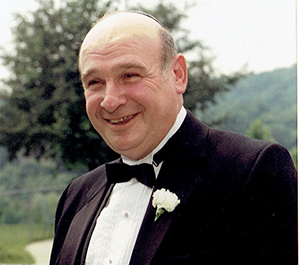
Preparing for Rosh Hashanah has always included reserving seats in shul, inviting guests, making a menu, and searching for the perfect new fruit. Since having buried my father just hours before the start of Rosh Hashanah in 2011, these past few years have brought with them the sobering reality of preparing for my father’s yahrtzeit as well.
If you moved to the West Englewood area of Teaneck between 1972 and the early 2000s your first friend in the community, whether you were 6 or 60, was my father, Al Amsel. He positioned himself in Bnai Yeshurun, either standing or sitting, to allow himself to greet everyone who walked through the door with a Shalom Aleichem, a warm hello, a handshake, a smile, a joke, and a welcoming word for all. Old and young, he was everyone’s first friend in the neighborhood. He was always cheerful, smiling, and sincerely interested in how you and your family were doing. Although it was through the birth of my oldest son, that he became a Zayde, my father was a zayde figure to many long before officially earning the title.
If you were in need of a place to rest for a few hours, a cup of coffee, a Shabbos or Yom Tov meal, or just a place where you were made to feel at home, my parents’ home was always open. People would drop in for a short visit or stay for months on end. It was the home that hosted many NCSY onegs and shalosh seudot, fierce Shabbos afternoon marathon games of RISK, and of course, on Pesach, breakfast for all after haskama minyan. My mother could be found in the kitchen, for hours on end, continuously “flipping” chremslach.
My father was a real shul goer–his home away from home was Bnai Yeshurun. Although he loved going to shul, his true passion was caring for “the people.”
If you were saying Kaddish and breaking your teeth on the previously unfamiliar words, he would stand by your side, not judgmental or impatient, rather with an upbeat and positive grace, making sure that you were comfortable at least in knowing that there was someone there for you.
He was the MC of the shul bazaars and treated “shoppers” as if they were VIPs and their purchases were the greatest of all goods.
When daf yomi was first inaugurated in the neighborhood, my father would rise well before the crack of dawn to make sure that upon their arrival at shul, the “crew” was greeted by the smell of freshly brewed coffee.
On Simchas Torah he could be found in the parking lot presiding over the delicacies served up and parceled out, with his followers lined up as if receiving blessings from a Rebbe.
On Shavuos night during breaks, he owned the kitchen, where large sheets of cheesecake of varying flavors were portioned out with love and coffee.
On erev Pesach, he and my mother, would have the giant barbeque in the backyard, fired up and ready by 5 a.m. for their first chometz burning “customers.”
In his declining years, while recuperating at Care One he managed to make himself “Mayor of the Minyan.” Once again, he could be heard greeting the visiting rabbi and those who were so committed to providing the residents with a weekly minyan, with his signature “howarya” as if they were old and dear friends.
My father’s generosity of home and heart were worth more than any check he could have written. He never met a stranger. Always with a twinkle in his eye and on the prowl for a good joke, he related to everyone as a human being and used his humor to find common ground. He taught me that everyone is just made of baser v’dam, flesh and blood. From custodial staff to the richest man in town to the most educated man, all are God’s creations and therefore worthy of attention and respect. Money, possessions, titles, and degrees did not impress him; your interactions with your fellow man earned you merit with him.
As we commemorate his third yahrtzeit on the eve of Rosh Hashanah, I miss him terribly. Although the pain is far less raw, I still so desperately crave seeing that twinkle in his eye and hearing one of his corny and old jokes one more time. They don’t make them like that anymore.
May we, as a community, heed the lessons that he taught us and, may his memory be for a blessing.
By Heidi Fuchs










